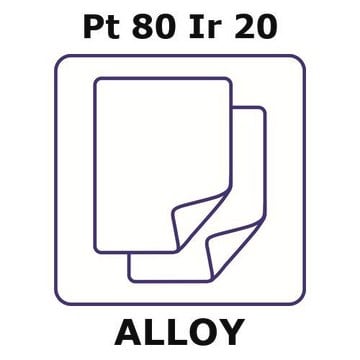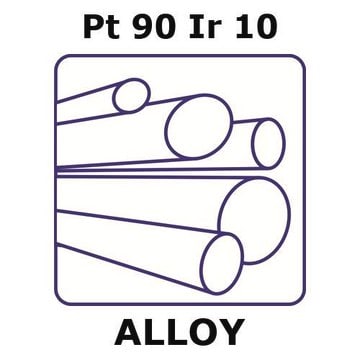GF57333573
Silver
rod, 100mm, diameter 8.0mm, as drawn, 99.95+%
Synonim(y):
Silver, AG007938
Zaloguj sięWyświetlanie cen organizacyjnych i kontraktowych
About This Item
Wzór liniowy:
Ag
Numer CAS:
Masa cząsteczkowa:
107.87
Numer MDL:
Kod UNSPSC:
12141740
Identyfikator substancji w PubChem:
NACRES:
NA.23
Polecane produkty
Próba
99.95%
Postać
rod
producent / nazwa handlowa
Goodfellow 573-335-73
rezystywność
1.59 μΩ-cm, 20°C
dł. × śr.
100 mm × 8 mm
tw
2212 °C (lit.)
mp
960 °C (lit.)
gęstość
10.49 g/cm3 (lit.)
ciąg SMILES
[Ag]
InChI
1S/Ag
Klucz InChI
BQCADISMDOOEFD-UHFFFAOYSA-N
Opis ogólny
For updated SDS information please visit www.goodfellow.com.
Informacje prawne
Product of Goodfellow
This page may contain text that has been machine translated.
Kod klasy składowania
13 - Non Combustible Solids
Klasa zagrożenia wodnego (WGK)
WGK 3
Temperatura zapłonu (°F)
Not applicable
Temperatura zapłonu (°C)
Not applicable
Certyfikaty analizy (CoA)
Poszukaj Certyfikaty analizy (CoA), wpisując numer partii/serii produktów. Numery serii i partii można znaleźć na etykiecie produktu po słowach „seria” lub „partia”.
Masz już ten produkt?
Dokumenty związane z niedawno zakupionymi produktami zostały zamieszczone w Bibliotece dokumentów.
Hajo Haase et al.
Journal of biomedical nanotechnology, 10(6), 1146-1156 (2014-04-23)
Silver is commonly used as an antibacterial agent, e.g., in various medical applications, and the availability of silver nanoparticles (AgNP) has fueled this development. Their antibacterial properties are well defined, whereas there are concerns regarding unknown and potentially harmful effects
S R Mueller-Spitz et al.
Letters in applied microbiology, 58(4), 330-337 (2013-11-30)
Polycyclic aromatic hydrocarbons (PAH) are a common environmental contaminant originating from both anthropogenic and natural sources. Mycobacterium species are highly adapted to utilizing a variety of PAH. Silver nanoparticles (AgNP) are an emerging contaminant that possess bactericidal properties, interferes with
Cheng-Kuan Su et al.
Toxicology letters, 227(2), 84-90 (2014-04-08)
With the increasing prevalence of silver nanoparticles (AgNPs) in various products, whether such AgNPs will introduce new injury mechanisms from new pathologies remains to be determined. From the toxicokinetic viewpoint, it is vital to have in-depth knowledge of their in
Swarup Roy et al.
Journal of nanoscience and nanotechnology, 14(7), 4899-4905 (2014-04-25)
Binding interaction of biologically synthesized silver nanoparticles with bovine serum albumin (BSA) has been investigated by UV-Vis and fluorescence spectroscopic techniques. UV-Vis analysis implies the formation of the ground state complex between BSA and silver nanoparticles. The analysis of fluorescence
Ana López-Serrano Oliver et al.
Environmental pollution (Barking, Essex : 1987), 189, 87-91 (2014-03-20)
Silver nanoparticles (AgNPs) are widely used in many applications and likely released into the aquatic environment. There is increasing evidence that Ag is efficiently delivered to aquatic organisms from AgNPs after aqueous and dietary exposures. Accumulation of AgNPs through the
Nasz zespół naukowców ma doświadczenie we wszystkich obszarach badań, w tym w naukach przyrodniczych, materiałoznawstwie, syntezie chemicznej, chromatografii, analityce i wielu innych dziedzinach.
Skontaktuj się z zespołem ds. pomocy technicznej





